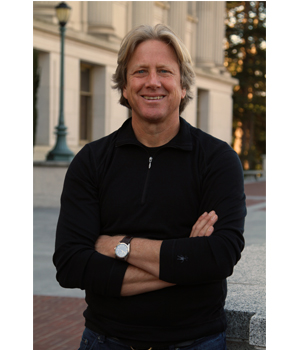
Dacher Keltner is fascinated by the dynamics of power that permeate the everyday. “Power shapes our every interaction,” says the professor of psychology at University of California, Berkeley and co-director of the Greater Good Science Center, who also happens to be the consulting psychologist behind Disney’s recent Pixar blockbuster “Inside Out.”
He’s talking about everything from negotiating with your newly licensed teen who wants to borrow your car, to making progress on projects at work, deciding who makes dinner, sibling conflicts and the dynamic between girls on the middle school playground. We might hold power in one interaction, then in the very next it might belong to someone else. Our days are like a relay race with the baton of power being handed off and accepted over and over again.
For 20 years, Keltner has studied the ways that power can change us and how we can use power to effect positive change for those around us. He shares some of his insights and findings here.
Redefining Power
To widen the discussion past boardrooms and political showdowns into the everyday, we first need to define what exactly is meant by “power.” If books, movies and shows are to be believed, money and might create power. In “House of Cards,” Frank Underwood utters witticisms like: “Shake with your right hand but hold a rock in your left,” and “The road to power is paved with hypocrisy and casualties; never regret.” In his fictional world, power, violence and deceit are bedfellows.
Keltner defines power more simply and generously as “one’s capacity to make a difference in the world by influencing the states of other people.” In his book, “The Power Paradox: How We Gain and Lose Influence,” he offers counter-examples to pop culture’s portrayal of power. “Many of the most significant changes in our history — the adoption of women’s suffrage, civil rights legislation, the free speech movement, and its influence upon the protests against the Vietnam War, the overthrow of apartheid, the rise of gay rights — were brought about by people who lacked economic, political and military might; they changed the world without coercive force.”
He also points out that coercive force is most typically used by those who are losing power or feel their power threatened — school bullies and domestic abusers, for example.
Power is Given by Others
Using coercion is an effort to take power whereas Keltner’s research shows that true power is given. “Exploitative, selfish, coercive behavior unravels the fabric of strong groups,” Keltner says. Accordingly, “groups give power to individuals who advance the greater good.”
He cites what researchers have found in more than 70 studies — conducted in financial firms, hospitals, manufacturing plants, university dormitories, schools and even the military — that those who possess the “Big Five” traits are most likely to rise to power. The “Big Five” — perhaps not what you’d expect — are: enthusiasm, kindness, focus, calmness and openness.
The Power Paradox
Machiavelli tells us in “The Prince” that, “The promise given was a necessity of the past: The word broken is a necessity of the present.” Unfortunately, when it comes to power, we often see abuses of this nature — promises made then broken, personality shifts and about-faces.
A pattern that Keltner has seen appear again and again in scientific studies is one he calls the “Power Paradox.” “We gain a capacity to make a difference in the world by enhancing the lives of others,” he says, “but the very experience of having power and privilege leads us to behave, in our worst moments, like impulsive, out-of-control sociopaths.”
He explains, “Two things make power a problem in human history: 1) What power feels like — it feels really good and makes us feel alive and strong, more willing to take risks and more attentive to our own interests, goals and desires. We may start to ever-so-slightly lose sight of what others want and are thinking about. We lose the socially intelligent edge that garnered power in the first place. 2) Certain kinds of people gravitate to those in power and often those are not the people that would keep our behavior in check.”
Learning to handle this paradox is paramount to achieving lasting, productive power. Keltner argues that the key is to strike a balance between the gratification of our own desires and our focus on others.
Handling Power With Social Intelligence
Keltner remembers feeling powerlessness as a student in graduate school. He felt inhibited by professors and nervous that he wasn’t as intelligent as his peers. “If I don’t feel powerful and I’m around others who are behaving with power, my creativity becomes diminished, my stress increases and I have no voice,” he says. It’s a situation many of us have faced.
So, how can those in positions of power create empowering environments? Keltner says now, as a professor in a classroom himself, he’s developed a few helpful practices: He avoids being too harsh, interrupting others and telling jokes that might hurt someone. “Those are minor abuses that wear down the fabric of a group,” he says. He makes sure to respect and dignify his students’ ideas and responses; humbles himself physically by using a soft voice, relaxing and occupying a smaller space with his body; addresses students by name; and uses kind, polite language.
Empowering Parenting
Nowhere is the ever-shifting and evolving exchange of power more apparent than in the act of parenting. It’s usually the frustration born from a power struggle that causes parents to lose their cool and raise their voices.
“When parents try to act in a hyper-powerful authoritarian way, kids react in opposition,” Keltner says. “If instead, we express authority but empower our kids by allowing them to reason through conflict and struggles, we’ll raise kids who are more morally engaged.”
Shaping the Behavior of Our Leaders
If groups give power, they can also take it away. This is true even in the larger arenas like boardrooms and government. Keltner reminds us that “groups are savvy to abuses of power, aware that once people are in power, they can quickly devolve into self-serving gratification machines, feeling entitled, at times, to harm others for their own gain.”
Leaders are held in check by ordinary people. Keltner urges, “You and I need to comment on the leadership style of those in power — whether through blogging, writing the editor, or simply talking to others. It’s a way of leveling power.”
Keltner will be speaking at a Family Action Network (FAN) event on Thursday, May 19 at 7 p.m. at New Trier High School’s Northfield Campus, Cornog Auditorium, 7 Happ Road, Northfield. The event is free and open to the public.
Want More?
- Have 5 minutes? Listen to an NPR Weekend Edition Saturday program where Keltner participates in the discussion, “When power goes to your head, it may shut out your heart.”
- Have 15 minutes? Read Keltner’s article “The Power Paradox” on the Greater Good Science Center site.
- Have a few hours? Read Keltner’s newest book, “The Power Paradox: How We Gain and Lose Influence.”
FAN Annual Sponsors: Martin & Mary L. Boyer Foundation, Compass Health Center, Erikson Institute,Evanston Township High School, Make It Better, Mammal Foundation, New Trier Township High School,Pathways, Tina & Byron Trott
FAN Strategic Partners: Acclaim Media, Center for Talent Development at Northwestern University, Curt’s Cafe, Evanston/Skokie School District 65, Hackstudio, Loyola University Chicago School of Law, Master of Science in Education Program at Northwestern University, North Shore Community Bank & Trust, Northern Suburban Special Education District, New Trier Parent Association, Northwestern University, Redefined Fitness, The Book Stall, The Family Institute at Northwestern University, Y.O.U., YWCA Evanston/North Shore
FAN In-Kind Sponsors: Kirkland & Ellis, Turing Group
More from Make It Better:

